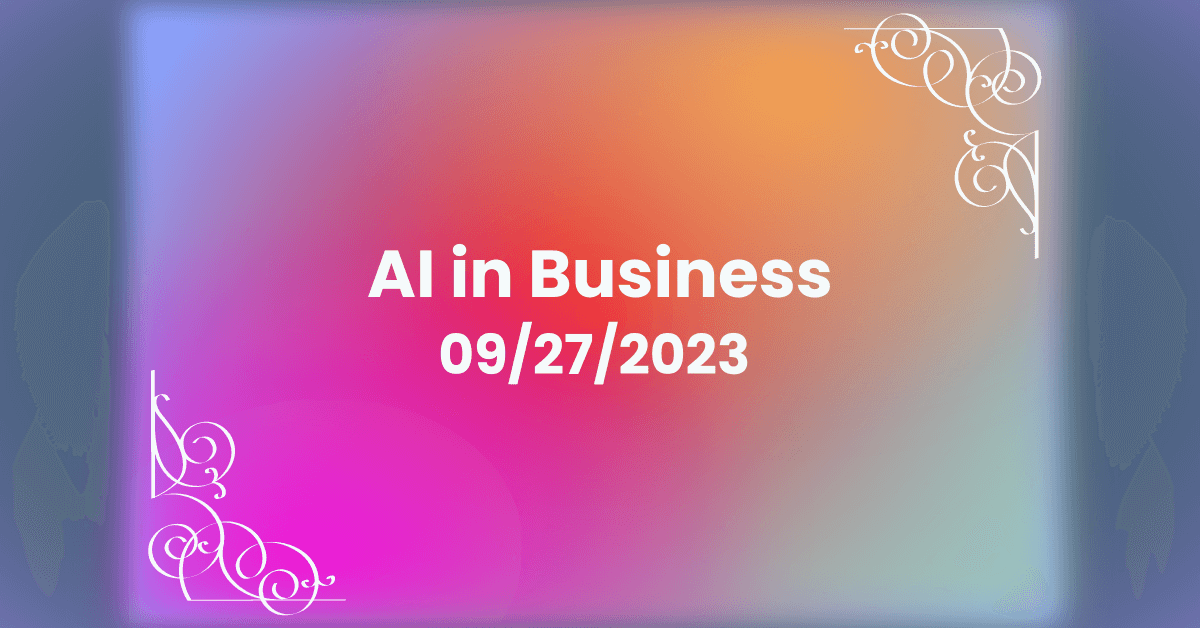Steps Small Businesses Can Take to Start Embracing AI
In a new article entitled Centaurs and Cyborgs on the Jagged Frontier, over on One Useful Thing, they delve into the significant impact of AI, particularly GPT-4, on the future of professional work. Conducted by a team of social scientists in collaboration with Boston Consulting Group, a study found that consultants using GPT-4 outperformed those who did not in 18 different tasks. The AI-assisted consultants completed 12.2% more tasks, finished 25.1% more quickly, and produced 40% higher quality results. If you have hesitated to engage AI fully within your business, these numbers ought to snap you out of it. The conclusion is that AI is not a future technology but a present disrupter.
Generative AI is becoming increasingly ubiquitous, embedded in everyday tools like email and word processing software, and has the potential to automate up to 70% of business activities by 2030. Despite its nascent stage, the technology is evolving rapidly, and businesses that don’t adapt risk being left behind. This is according to an article entitled, The organization of the future: Enabled by gen AI, driven by people, by McKinsey & Company.
The article emphasizes that business leaders must think strategically about implementing generative AI. They should demystify the technology for their teams and align its use with organizational objectives. One of the key messages is to counter fears of job loss due to automation with the potential for “augmentation and improvement” that generative AI offers. Leaders are encouraged to identify high-impact applications for pilot testing and rapid scaling. The technology also has profound implications for talent management, potentially disrupting traditional mentorship and skill-building programs. It suggests that generative AI can catalyze organizational change, affecting everything from corporate culture to the nature of work itself. Therefore, leaders must proactively understand and leverage generative AI’s capabilities to stay competitive.
Want to implement AI into more of your business, but need to figure out how? Here are some steps small businesses could take to start embracing AI:
Step 1: Identify Business Needs
- Assessment: Conduct a thorough assessment of your business processes to identify areas where AI could add value.
- Prioritize: Focus on high-impact areas where automation and data analysis could bring significant benefits.
Step 2: Educate the Team
- Training: Provide basic AI and machine learning training to your team.
- Awareness: Make sure everyone understands the benefits and limitations of AI.
Step 3: Budget and Resources
- Allocate Funds: Set aside a budget for AI adoption. (you’ll save money in the long run)
- Resource Planning: Determine if you’ll need to hire new talent or if your current team can manage the transition.
Step 4: Choose the Right Tools
- Research: Look into various AI tools that fit your business needs.
- Consult Experts: Consult with AI experts to guide your tool selection.
Step 5: Pilot Testing
- Small-scale Tests: Run pilot tests to evaluate the effectiveness of the AI tools.
- Feedback Loop: Collect feedback from team members and make necessary adjustments.
Step 6: Data Preparation
- Data Collection: Gather the data that the AI tools will need.
- Data Cleaning: Ensure the data is clean, organized, and ready for analysis.
Step 7: Implementation
- Integration: Integrate the AI tools into your existing systems.
- Training: Train your team on how to use the new tools effectively.
Step 8: Monitor and Optimize
- Performance Metrics: Establish KPIs to measure the success of the AI implementation.
- Optimization: Continuously monitor performance and make adjustments as needed.
Step 9: Scale
- Expand: Once the pilot phase is successful, consider expanding the use of AI tools to other areas of the business.
Step 10: Keep Learning
- Updates: AI is a rapidly evolving field. Keep your team updated with the latest trends and technologies.
- Iterate: As you gain more experience, revisit your AI strategy and make improvements.
By following these steps, small businesses can gradually integrate AI into their operations and culture, positioning themselves for greater competitiveness and growth.







